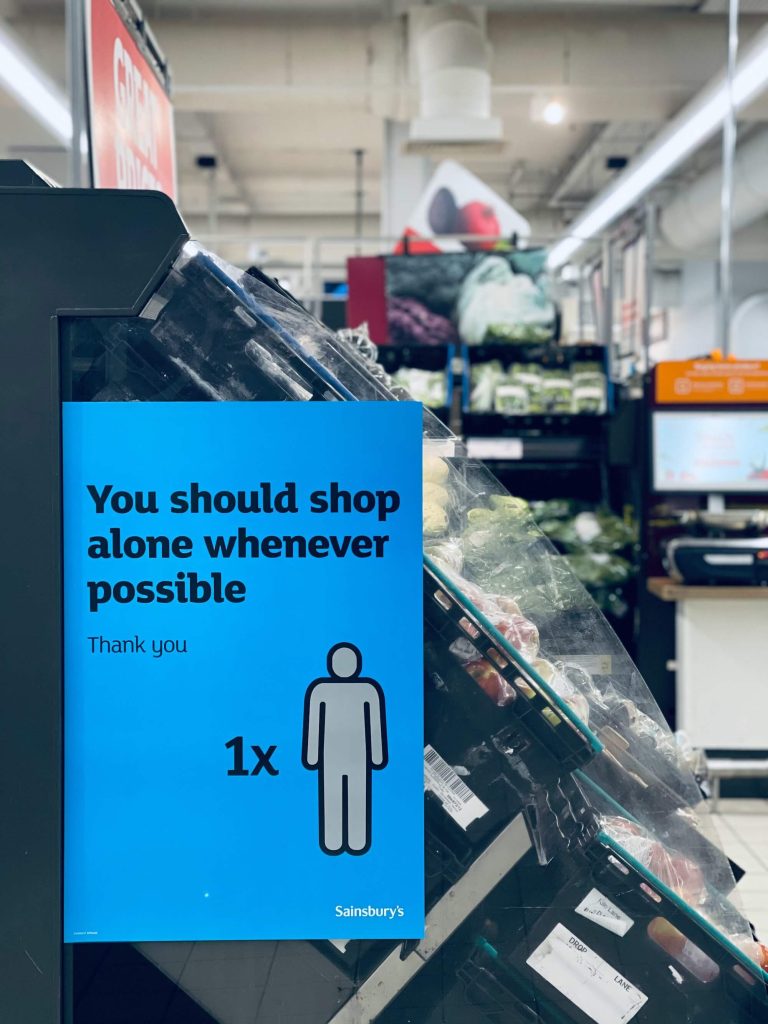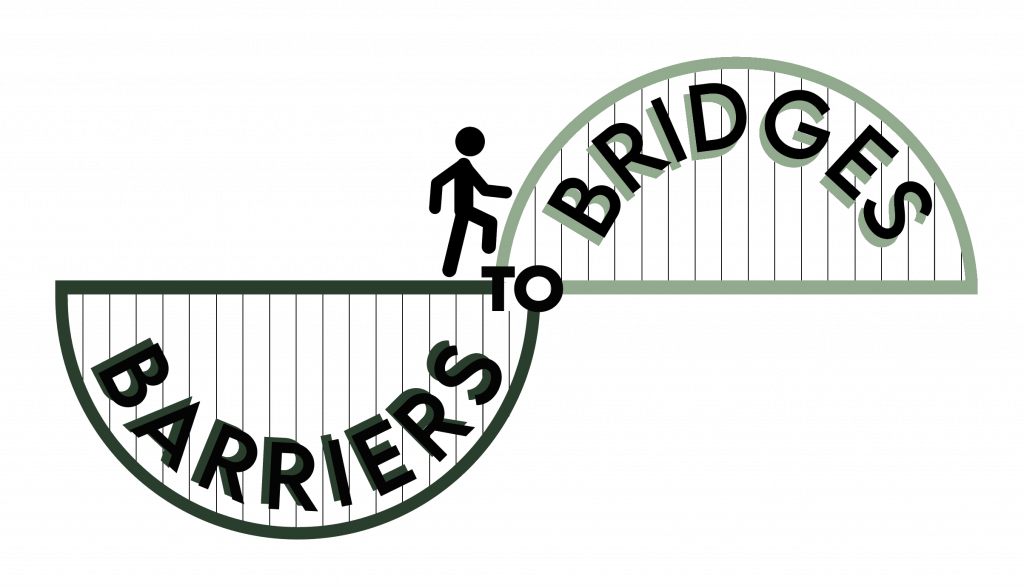by Auriol Britton
I have shopped at my local Sainsbury’s since 1998 and was a customer of the company for much of my life before that time. I learned a lot about independent living skills when studying at New College Worcester, and I am a strong believer in emancipation and equality of opportunity for blind and partially sighted people.
I typically do a large Sainsbury’s shop every fortnight and top up with a few items at small shops in-between. When buying a lot of items, I use a service called Assisted Shop. I arrive in store with a print and braille list, and an assistant is found. I then hold on to the handle at the back of the trolley, and they pull it along from the other end. They help to pick the items on the list, selecting for freshness, checking for special offers, making substitutions where necessary. Then we go together to the till – I will often load the belt, while the assistant packs the bags at the other end, and someone at the till scans the items. the assistant shows me to the perimeter of the carpark, I take my wheeler and reusable bags, and head for the bus-stop.

This worked well until spring 2020 upon covid lockdown … On 24 March 2020, Sainsbury’s supermarkets Ltd officially suspended the service.
The phone line for ordering shopping operated by the company had no availability and was closed to new registrations.
Some people might say, ‘why didn’t you just shop on-line’ – That’s what other people did. Unless you were on the government shielding list, you couldn’t obtain a slot, and although it might have made sense to include those who required extra support to shop as well, Sainsbury’s did not do this. The excuse for everything was, ‘we’re following government guidelines’ as though they had suddenly become a state-owned company, not capable of making their own decisions. On-line shopping relies on someone else being trusted to make substitutions, knowing what it all is when it arrives, and a co-operative delivery driver – I live in a large block of flats.
To be able to buy food, I had to recruit and train my own volunteers to do free work in Sainsbury’s. My good friend Roger, who was helping me with driving to and from the store at the time, cannot do a shop; he can fix a classic car, but cannot identify a packet of pasta – Our friendship nearly broke down over it.
After several months and some reneging, Sainsbury’s proposed what I call the Remote List Method. This meant me turning up with a printed list, and a shop worker going round and picking the items – I would then meet them at the till. I very much doubted this would work for a big list – there are too many variables – even in just buying black bags, there are about four choices. Yes, a red onion is a red onion, but if you wanted, for instance, a savoury pie – (I cook most meals from scratch but keep a couple in the freezer for emergencies). There might be about four different brands, different fillings – you can’t know what is there without going to the chiller and checking yourself. It’s your money you’re spending – someone else can’t guess what you might want to buy. A large supermarket might stock twenty-five thousand or more lines: you can’t possibly memorise it – there is new stuff coming out all the time, and both seasonality and availability must be taken into account.
Nevertheless, showing willingness to adapt, proving the shortcomings of the remote list method, I tried it twice. For one paragraph of my list, which is typically over fifty items long. The first time, it wasn’t too bad. Choosing the fruit and veg section, a competent and experienced staff brought back much of the right stuff. However, on the second occasion, I chose chilled items, including exotic cheeses. There is lots of choice which is all part of the experience. Predictably, this method went completely wrong on this occasion, and the person had to take everything back.
I proposed an alternative way of shopping, I called the Pass-the-parcel method. This consists of an assisted shop, but staff were to wear masks, gloves – full PPE if they wished and work for fifteen minutes, before handing over to a colleague. Something similar was tried in Asda, when I was buying items radically varied in spring 2021, proving it could work. Sainsbury’s wouldn’t try my suggestion and for all their talk of social distancing, “following government guidelines”, for much of the time, there was little social distancing, and staff were not wearing masks.
Readers might recall the preferential hour, for customers who were either elderly or had a disability – it was typically early in the day, two or three times per week. One might have thought – even if they could not assist at other times, they could have done so during the preferential hour, but it was little different from any other hour, People with disabilities were allowed to bring someone in with them, when others were not.
In spite of substantial correspondence with the company, the matter was not resolved and although assisted shop was restored sometime in autumn 2021, I last received it on 6 April 2020, and next on 9 Feb 2022.
I brought a case in the small claims track at Bristol County court, and despite the defendant’s arrogance and their assumption they would win, they lost. This was quite a surprise to everyone, and I was warned it could go either way – the judge might well accept a defence of “following government guidelines”.
The judge ruled, it had been acceptable to withdraw the service initially. However, once social distancing guidelines reduced from 2 metres to 1 plus, on 26 June 2020, in conjunction with masks and other PPE, in the ventilated store, providing assistance would have been safe. Remote list method was determined not to be a reasonable adjustment, whereas pass-the-parcel would have been. Allowing people to bring their own assistant was dismissed as asking people with disabilities to make their own adjustments.
The defendant admitted they had withdrawn the service for longer than was justifiable.
I am delighted to have won, but bringing the case involved a lot of work, it was very stressful and tiring. Other problems included: a lack of court letters in accessible formats, meaning I had less time in which to act than would otherwise have been the case. not knowing what to expect, I am quite an educated person, yet the process felt difficult to understand – how people with English as a second language, or those with an intellectual impairment manage, goodness knows – they would be at an immense disadvantage when trying to access the justice system and doing a bundle was a nightmare … The law centre was very helpful, supporting me to bring the case myself – the lawyer was very good, but left his job two weeks before the hearing. There was an assumption I knew what terms: directions, questionnaire and allocated meant, yet I’d never come across these terms in those contexts.
It is regrettable that neither the RNIB (Royal National Institute for the Blind) nor the EHRC (Equality and Human Rights Commission) would assist on this case. I feel vindicated!
People with Disabilities don’t need a food parcel – they need the right support to make their own nutritional choices independently. More people should bring court cases when the Equality Act is broken in respect of provision of goods and services. It’s intimidating – you feel as though you’re not in control, even if you are the claimant, it is daunting. Persevere, have your documents well in order, take legal advice from a law centre or disability charity. Organisations such as RNIB should forget about having meetings with government, and support more visually impaired people to bring court cases. Don’t let big organisations assume persons with disabilities are too weak and pathetic to challenge discrimination – you can! Court judgments speak louder than waffle…
© 2022
